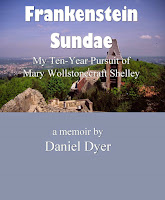So … June
1999 … I was reading Transfusion, the posthumous novel of William Godwin,
Jr., who had passed away—cholera—in September 1832, a novel prepared for
publication by the late author’s father and his half-sister, Mary Shelley.
I knew then that
my father was dying. In fact, he would live only five more months. He’d had
heart problems, a series of strokes. Physically, he was nothing like the man
I’d known when I was a boy—Dad, the former high school track and football star,
the man who’d gone to World War II (serving both in the Pacific and in Europe),
who’d been summoned back to service during the Korean War (though he,
fortunately, was assigned to serve as a chaplain at Amarillo Air Force Base and
did not have to go abroad), who’d worked hard to earn his Ed.D. at the
University of Oklahoma and had taught at Phillips University, Hiram College,
Drake University. But at this point, the summer of 1999, he was barely with us.
I was writing to him a couple of days a week, calling—but I'm not sure if any of
it meant much to him.
So it was in
this deepening darkness that I read the novel by a son who’d died before his
father. A young man who’d lived to be only twenty-nine. I read about his
father’s grief, about Mary’s. And in a way I had already begun to prepare for
my own imminent loss of my father. And now, here I sit, typing, more than
sixteen years after his death, and I still feel his presence in my room—in me—and the thought of his loss is as
impaling as it had been in November 1999.
I imagine
William Godwin and Mary, looking over the pages left behind by William Jr.
Seeing his handwriting, remembering in every slant and curve of his letters the
loved one they had lost. I imagine them talking to each other, Mary and her
father. Sharing stories. Maybe some regrets. Did Godwin feel some? He surely must
have. (What father doesn’t have
some?) Did Mary wish she’d kept in closer touch with him? (The regrets of
siblings are every bit as painful.) He’d been just a boy when she’d fled with
Bysshe in the early morning hours, fracturing the glass of family. In one way,
his book would be their letter of regret, the partial payment of their debt of
honor.


No comments:
Post a Comment